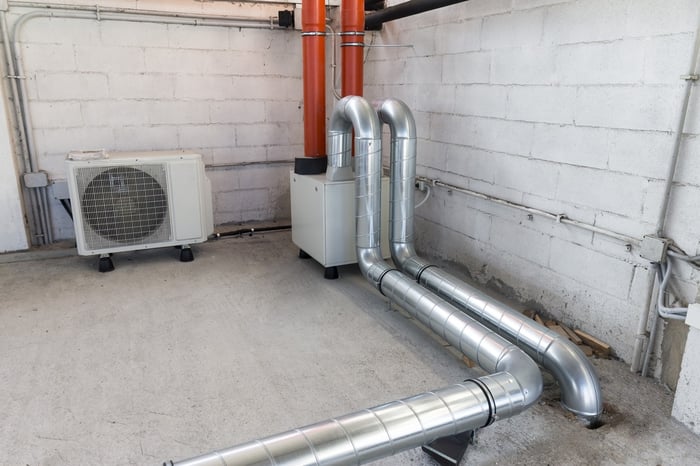A Heat Pump Can Supply Affordable Comfort to Your Chicago Home

Heat pumps are just one option when it comes to HVAC systems that will heat and cool Chicago homes. They aren’t new in terms of heating and cooling systems, but the most recent designs utilize highly efficient technology and can dramatically decrease energy costs.
Similar to central cooling and heating systems that utilize refrigerants to operate, instead of working through a closed loop, heat pumps move heat from a cool to a warm space like a refrigerator with condenser coils does.
Heat pumps are commonly used together with a furnace that may be electric or fueled with oil or gas.

A heat recovery unit for mechanical ventilation
How Heat Pumps Work
Heat pumps work in the opposite way to traditional air conditioners. At the same time, they can be designed to operate as an air conditioner as well as a heater, so heating and cooling are taken care of by one machine. In winter the heat is moved from the ambient air outside even if though the air is colder than the warm air inside the building. In summer, heat pumps move the heat from inside the cool house, outdoors.
Additionally, energy-efficient heat pumps dehumidify the air more effectively than standard air conditioners, which makes the environment more comfortable in the summer season.
Heat pumps may also be used to reduce greenhouse gas emissions. Electric heating that runs on clean power is one way to get heat without emissions. The problem though is that electric resistance heaters including baseboard heaters and furnaces are very expensive to run. Heat pumps, on the other hand, will deliver the same heat input for a fraction of the price because they use two to four times less power than resistance heaters do.
The Municipal Code of Chicago defines a heat pump as a “refrigeration system that extracts heat from one substance and transfers it to another portion of the same substance or to a second substance at a higher temperature for a beneficial purpose.” These, like all heating, ventilation, and air-conditioning systems must be designed and installed “or efficient utilization of energy” in accordance with the section on energy conservation in the Code.
But not all heat pumps are the same as the US Department of Energy points out on its website. There are several types, primarily:
- Air source heat pumps (ASHP) that are also known as air-to-air heat pumps
- Geothermal heat pumps that may rely on ground-source or water-source heat
- Absorption heat pumps
Air Source Heat Pumps
In the past decade, it has become common for engineers to design forced-air systems using heat pumps rather than electric furnaces because they are so much more efficient. As already mentioned, they also have great capabilities when it comes to air conditioning.
Air-to-air or ASHPs are the most common type used in US cities including Chicago. Technological improvements to air-source heat pumps in recent years have made them effective in most climatic conditions, even in colder winter regions like Chicago.
While some air-to-air heat pumps are installed with ducts, mini-split heat pumps don’t require ducts. Like regular air-source heat pumps, they are comprised of two main components:
- An outdoor compressor or condenser
- An indoor unit that handles the air
Additionally, there is a conduit for the power cable, suction and refrigerant tubing, and a drain linking the two units.
The fact that they don’t have ducts make them even more energy efficient.
While these heat pumps are ideal for retrofit add-ons in homes that don’t have ducted heating systems, and for heating and cooling individual rooms, it is essential to use a unit that is Energy Star compliant.
There are also reverse cycle chiller heat pumps generate water that is hot and water instead of air, which allows them to be used as part of radiant floor heating systems.
Like all HVAC systems, it is essential that air-source heat pumps are correctly installed in accordance with the MEP engineer’s design. If it is properly installed, an ASHP will be able to deliver up to three times more heat energy than the electrical energy it uses. This is because heat pumps move heat rather than convert it from some sort of fuel.
Geothermal Heat Pumps
Although more expensive to install than ASHPs, geothermal heat pumps boast considerably lower operating costs and are said to be 400 percent efficient as opposed to an ASHP that is 250 percent efficient. This rating is based on the units of heat the machine produces using one unit of electricity – in this case, 4 units versus 2.5 units – and the initial costs are recouped within five to ten years.
As a comparison, most gas furnaces are rated at only 80 percent efficiency!
Ground-source geothermal heat pumps have a number of major advantages, particularly in extreme climatic conditions. But it does depend on the size of the property as well as the landscape and subsoil since this is the source of heat. So, while it might be scorching hot in Chicago in summer and freezing cold in winter, the ground beneath the surface stays at a relatively constant temperature.
Absorption Heat Pumps
The newest type of heat pump that is used for residential properties is known as a gas-fired (because they are commonly fired by natural gas) or absorption heat pump. While they all use heat as the source of energy, they can be operated using a wide variety of heat sources – but not electricity.
Instead of evaporated ammonia (which is the refrigerant) being pumped at pressure in a compressor, it is absorbed into water and then boiled out of the water via the coil. When it absorbs the heat it cools the environment and when it releases heat it warms the interior.
Generally, absorption heat pumps and coolers are the solution for homes where there isn’t a source of electricity. However, they can operate using any heat source including geothermal hot water and solar energy. They also work well when different parts of a home need to be kept at varied temperatures.
Is a Heat Pump the Best Option for Your Chicago Home?
The quick answer is probably yes!
Certainly heat pumps are energy-efficient and they provide versatile comfort solutions in winter and in summer. But every house is different.
Whether you are building a new home or need advice on retrofitting an old one, our MEP team is available to give you invaluable advice and will design and make sure your HVAC system works for you and your family.

Michael Tobias
Michael Tobias, the Founding Principal of NY Engineers, currently leads a team of 150+ MEP/FP engineers and has led over 4,000 projects in the US
Join 15,000+ Fellow Architects and Contractors
Get expert engineering tips straight to your inbox. Subscribe to the NY Engineers Blog below.
